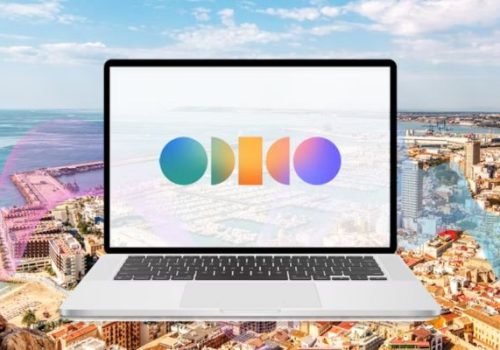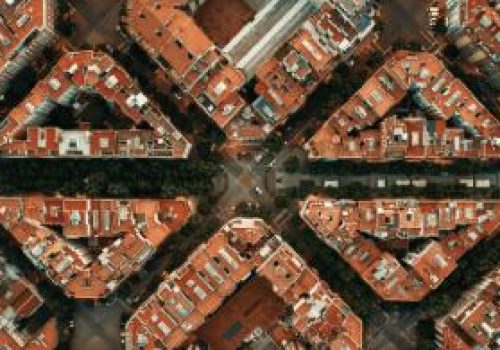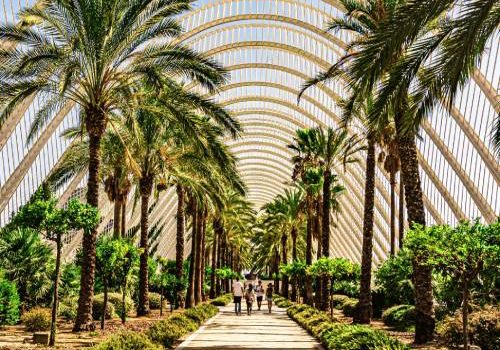Live and work in Malaga
Pablo Picasso’s hometown, on the southern Spanish coast of the Costa del Sol, is a gem that has been somewhat overshadowed by other major cities such as Barcelona and Madrid. Malaga is Spain’s sixth largest city and a major port and tourist centre. Almost 3,000 years old, Malaga is one of Europe’s oldest cities and was founded by the Phoenicians around 700 BC. The Phoenicians named Malaga Malaka but the city was conquered and became part of the Roman Empire around 200 BC. Today, Malaga is an important city in Spain where tourism, construction and technology are the main sources of income.
Latest job openings in Malaga & Spain
- Hotel jobs, Tourism
- Cyprus, Greece, Spain
- Customer support
- Spain
- Adventure jobs, Hotel jobs, Tourism
- Bulgaria, Croatia, Egypt, Greece, Italy, Spain, Turkey
- Customer support
- Spain
Fun facts about Malaga
Language: Spanish
Currency: Euro
Capital: Madrid is the capital of Spain
Population: Half a million inhabitants live in Malaga
Known for: Beautiful beaches, good food and Pablo Picasso
Good to know: Residents of Malaga are known as anchovy fishers (boquerón).
Working in Malaga
Working conditions in Malaga
Your working week will depend on your job, as the labour market in Malaga is largely based on seasonal work in tourism. This means that you can work for many hours a day during the summer period – which here tends to be from April to November – and then you are off for the rest of the year. On the other hand, if you have a permanent job with one of the big international companies, you will almost certainly work 8 hours a day, 5 days a week, but this may vary depending on the company you work for. If you work full-time in Malaga, you are legally entitled to 22 days’ holiday (22 working days or 30 calendar days) in a year.
Salaries in Malaga
In 2021, a minimum salary threshold was set in Spain at €1,108 gross per month. An average salary in Malaga in 2021 is around €1,200 net a month.
Income tax in Malaga
Spanish income tax (IRPF) is based on a progressive tax system where you pay more tax the higher your income. In Spain, you pay 19% – 47% income tax depending on your income. For incomes above €300,000, 47% of income tax is deducted (regional tax + state tax). For more information on the Spanish tax system click here.
Popular jobs in Malaga
The most popular jobs in Malaga include tourism, construction, engineering, healthcare, service and catering. Malaga is one of Spain’s most visited tourist resorts, so there are many job opportunities in the tourism sector, including hospitality, tour management and tourist guiding. The construction industry is also very active in Malaga due to the increasing demand for new buildings and properties. In the technology sector, many companies are looking for technically skilled employees, such as software developers and engineers. The healthcare and service sectors are also important employers in Malaga, with many job opportunities for nurses, doctors and service desk workers.
Finding jobs in Malaga
Despite a high unemployment rate in Malaga, it is possible to find expat jobs thanks to some constantly expanding sectors. You can find many interesting jobs on our website. The property market is one of these sectors. The growing economy has contributed to the construction of both office buildings and private properties in the city. Malaga is also home to Spain’s second largest port, which contributes to many jobs in transport and logistics. The large science centre Malaga Technology Park, home to over 600 different companies, also contributes to many jobs in IT and research.
Below are some steps that can help you find a job in Malaga:
Use job sites: You can start by searching for jobs on websites such as Indeed, Monster, Glassdoor and LinkedIn or recruitment agencies such as City Job Offers. These sites often have a large database of job adverts in Malaga.
Use your network: ask your friends, relatives or colleagues if they know of any job vacancies in the area. Many job adverts are never published online and are instead obtained through word of mouth.
Contact companies directly: Make a list of companies in Malaga you would be interested in working for, and contact them directly to see if they have any vacancies.
Use social media: Use your LinkedIn profile to look for jobs in Malaga. You can also follow companies you are interested in working for and see if they post job adverts on their social media pages.
Use local job centres: There are many job centres in Malaga that can help you find suitable employment. They often have a wide network of contacts and can help you with both applying for jobs and preparing for interviews.
Applying for a job in Malaga
The application process in Malaga can be a bit different compared to other cities, so it is important to know what to consider when applying for jobs in the Spanish city.
First of all, it is good to prepare yourself in Spanish, as many companies in Malaga require good language skills in this language. It might be a good idea to get a Spanish CV for potential employers.
Another important thing to consider is to be out in good time. Many companies in Malaga start recruiting already months in advance, so it is important to start looking for jobs as soon as possible.
There are many ways to look for jobs in Malaga, including going to job centres, submitting applications to companies you are interested in, or applying for jobs through online job portals. Many companies also have their own websites where you can submit your application directly.
Once you have submitted your application, it is important to be patient and wait for a response. Many companies in Malaga take longer to respond to applications, so it’s important not to get frustrated if you don’t hear anything straight away.
Finally, it is important to be prepared for the interview. Many companies in Malaga will want to see that you have a good knowledge of the company and the industry, so it’s a good idea to do some research before going to the interview.
Finally, it is important not to give up. The application process in Malaga can be tough, but with good preparation and patience, it is possible to find a great job in this beautiful city.
Networking in Malaga
To expand your network in Malaga, you can make use of various online sites like The Local or Linkedin. By joining various Facebook groups, you can get help from other expats to find a job or accommodation.
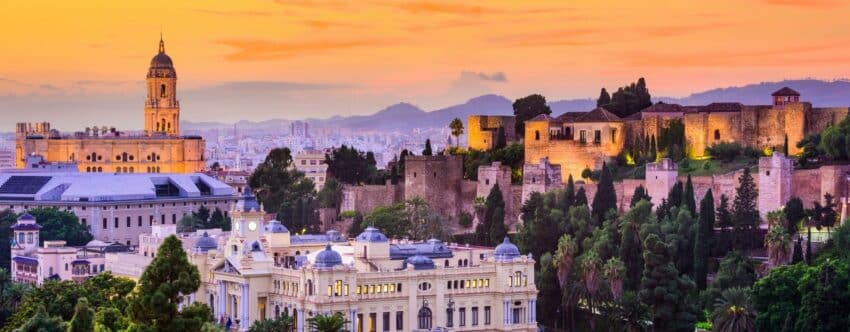
Living in Malaga
Living near the sea in the south of Spain is a dream for many and this is precisely why Malaga has become a popular getaway for many digital nomads and expats from all over the world. A good climate and access to the beach practically all year round are some of the advantages of living in Malaga. Good food and modern apartments at good prices are another.
However, the flip side of the coin is that once you’ve seen and experienced it all, there’s not much more to do than drink a glass of wine, go to the same restaurants and relax on the beach. If you think the climate at home north Europe sucks, you might find that it’s not so bad with a little cooler winds when it gets over 30 degrees hot in the summer and humid so that the clothes stick to your body. How much you crave and tolerate heat can be individual, but imagine going for a romantic walk with your partner and all of a sudden you feel that you are reached by a disgusting and stinky odour. Either you’ve stepped in dog poo or it’s quite possible that your nose has been reached by the smell coming from all the rubbish bins in the city.
In the summer, when it gets very hot, it is common for the rubbish – especially if there is food – to smell awful. Garbage collection has improved but the famous stinky smell will follow you for many walks. No city is perfect and if you manage to turn a blind eye to these little things you will find that life in Malaga means a more relaxed style and that the inhabitants of the city – the boquerón – are extremely friendly and helpful.
Advantages of living and working in Malaga
Not sure if Malaga is the right city for you? Here are 5 good reasons to pack your bags and move to Malaga to live and work in Europe’s sunniest city.
The weather
Malaga is the city in Europe with the highest winter temperatures. Here you can enjoy sunshine for as many as 300 days a year and only 45 days of rain at most. During the rest of the year, the average temperature is between 20-30 degrees, which is not bad.
Apartment with a sea view
As Malaga is on the coast, it’s almost inevitable that most apartments will have a pool or terrace with a sea view, so next time you’re having lunch you might be sitting on your terrace in Malaga looking out over the sea.
Good infrastructure
Malaga is home to the largest airport in southern Spain and the fourth largest in Spain, so you can easily reach other destinations in both Europe and the world from here. It also has high-speed trains that can take you to other cities like Barcelona and Madrid. The roads are also new and modern and in just an hour or so you can reach other cities in Andalusia such as Cordoba, Marbella, Seville and Granada.
Cheap city
Malaga is still a relatively cheap city compared to other cities in Spain, and you can eat out for cheap. Thanks to the warm climate, you’ll also always have access to fresh fruit and vegetables, which you can buy at many local markets.
Different job opportunities
If you work in research, Malaga is the city for you. It’s home to the Malaga Technology Park, which is often compared to Silicon Valley. Companies such as Google, Microsoft, Fujitsu, Vodafone and Andalusia’s largest bank Unicaja are all located here.
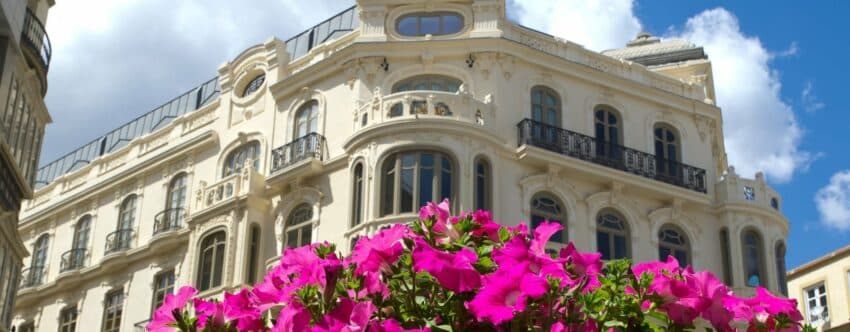
Accommodation in Malaga
Property prices and rents in Malaga have risen in recent years, but it is still possible to find good apartments at reasonable prices. The first thing to think about is where you want to live in the city as there are some interesting neighbourhoods to choose from. The best thing is to think about what is most important to you during your stay in Malaga and then choose from there. Some of the better neighbourhoods are these:
Old Town
This is where all the sights and the best shopping are. Rents are usually higher here.
Pinares de San Antón
A popular residential area with many new and modern apartments and villas.
La Malagueta
A residential area located right by the sea and close to the city centre. There are many promenades, bars and restaurants.
Soho
A trendy neighbourhood close to the city centre and the port.
Now that you’ve decided on a neighbourhood, it’s time to start looking through the ads. The best adverts are online and you can count on them being up-to-date. Check websites such as idealista, fotocasa and enalquiler and make sure the landlord gives you a contract with all the terms and conditions, as well as a list of the tools and furniture and their condition. A one-bedroom apartment in the city centre can cost you between €600-800 a month, while a similar apartment outside the centre will cost you between €400-700 a month, so if you don’t mind commuting, it might be worth living a little outside to save money.
Transport in Malaga
Getting around Malaga is easy and you have many options to choose from. The most convenient way is to take the bus which will take you to most places around the city. The company that runs the buses is called EMT and a single ticket costs €1.30 while a monthly pass costs around €40. Tickets can be bought at the station or at various kiosks – selling tobacco – around the city. Malaga also has a metro with two lines running through the city (west and south-west areas), and high-speed trains that can take you to other cities in Spain. Another convenient way to get around is by walking. Distances are not too great in Malaga and you can discover new things while you exercise. There are also some places that have bike hire if you prefer to cycle.
Eating in Malaga
As Malaga is a coastal city, you will eat a lot of fish and seafood here. At the beach you will find many chiringuitos, which is a term for a beach kiosk located by the sea, and in these you can eat fresh fish and drink a glass of wine at a reasonable price. You can also pick up local produce and fresh fruit at one of the local grocery stores called ultramarinos, or take a trip to one of the city’s food markets for charcuterie, olives, cheese and other goodies. For fine dining, there is one Michelin-starred restaurant in Malaga and 5 others listed in the Michelin Guide that are also worth a visit.
Keep an eye out for these restaurants if you live and work in Malaga.
La Alacena de Francis
A small restaurant serving typical Andalusian dishes with some Russian influences. Try one of the fish dishes and enjoy some good wine.
Doña Inés
A trendy restaurant serving traditional Spanish dishes with a modern twist. There’s also an outdoor seating area and a bar that mixes some of the best cocktails in town.
La Tranca
In the mood for tapas? Then La Tranca is the place for you. Serving simple tapas dishes accompanied by good wine, what makes this place special and popular is the lovely atmosphere of waiters singing and people chatting.
Jose Carlos Garcia
Located in the harbour district, this restaurant has been awarded a Michelin star. A different tasting experience with many small dishes to try and an impressive wine list.
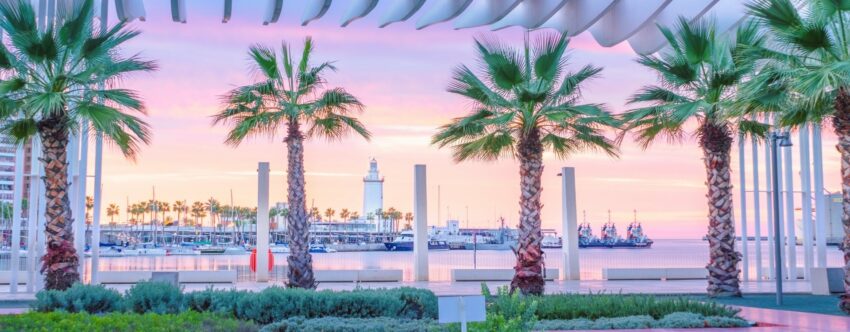
Going out in Malaga
As the sun sets over Malaga, you might fancy having a glass of wine or sipping a cocktail while enjoying the sunset. To do this, head to one of the city’s many bars or why not head up to a rooftop bar where you’ll also have a view of the whole city.
This is the best nightlife if you live and work in Malaga.
Malaga Palacio Hotel
The hotel is one of the tallest buildings in the city and on the 15th floor you’ll find a rooftop bar with great views of the whole city. The bar is open all day, so you can come here whenever you want to sunbathe, or have a drink before dinner and meet new people.
Antigua Casa Guardia
This is the oldest bar in Malaga and has been open since 1840. It is rumoured that it was even Picasso’s favourite bar and a place he often went to. You can visit the wine cellar and drink wine and eat tapas very cheaply. Many of the city’s locals hang out here and the bar is a must if you live and work in Malaga.
Pacha Costa del Sol
One of the city’s trendiest nightclubs with techno and lounge music. The nightclub was designed by Spanish artist Jorge Goula and the boat-shaped bar offers great cocktails and other drinks.
Velvet
Located in the city centre, this is a concert hall that turns into one big party on weekends.
Cost of living in Malaga
The cost of living in Malaga, one of the most popular tourist cities in Spain, is quite low compared to other European cities. The average monthly cost for a single person is around 8,000-10,000 €, including accommodation, food, transport and maintenance.
Accommodation in Malaga is quite cheap compared to other cities in Europe. A simple one-bedroom apartment in the city centre can cost around €4,500-5,500 a month, while a larger apartment near the sea can cost around €8,000-9,000.
Food costs are also low in Malaga. A dinner in a restaurant can cost around €200-250, while a daily shopping spree at a local market can run you around €400-500 a month.
Transport is cheap in Malaga, with a single ticket on the bus or metro costing around €20. A car hire for a month can cost around €2,000-3,000.
Entertainment, including leisure activities and entertainment, is also cheap in Malaga. A cinema ticket can cost around €100, while a night out in a nightclub can cost around €200-300.
Overall, the cost of living in Malaga is low compared to other European cities, making it an attractive choice for those seeking an inexpensive lifestyle in one of Europe’s most vibrant cities.
Landscape and nature in Malaga
Malaga is a beautiful city located on the Spanish coast of Andalusia, with a unique combination of landscape and nature. The area is known for its white villages, beaches, mountains and national parks.
One of the most famous mountains in the area is La Concha, which rises above the Marbella skyline. It is a popular destination for hikers and mountaineers, with great views of the Mediterranean from the top.
Near Malaga you will also find the Sierra de las Nieves National Park, which forms part of the Serrania de Ronda mountain range. Here you will find a great diversity of animal and plant life, with excellent opportunities for hiking and excursions.
The coast of Malaga is also one of its main attractions. There are many beaches to choose from, ranging from busy city beaches to small coves that are more secluded and quiet. Playa de la Malagueta is one of the most popular, with its soft sand and crystal clear waters.
Another great destination for nature lovers is the Caminito del Rey, a narrow path that runs along a ravine and through rock walls. Once a dangerous and notorious path, it is now a well-maintained tourist attraction that offers a unique and exciting experience.
In conclusion, Malaga offers a diversity of landscapes and nature, from mountains and national parks to coastlines and beaches. Whether you want to hike, sunbathe or have an adventure, there is something for everyone in this beautiful part of Spain.
The climate in Malaga
Malaga is a beautiful city located on the south-west coast of Spain and has a warm and sunny climate. Generally, the city has a subtropical Mediterranean climate with mild winters and warm summers. Temperatures in Malaga stay around 20 degrees Celsius for much of the year.
Summer in Malaga is long and hot with average temperatures of up to 30 degrees Celsius. These high temperatures, coupled with the high humidity, can make summer hard for some. But for those who like heat, summer is a dream. The sun shines almost every day and there are few rainy days during the summer months.
Winters in Malaga are mild and rainy. Average temperatures are around 15 degrees Celsius and there are many rainy days during the winter months. However, winters are still warm compared to other parts of Europe.
What you can’t miss in Malaga
All around Malaga there are traces of the city’s history and cultural heritage dating back almost 3,000 years. Just walking around you will see traces of the Roman, Phoenician and Moorish empires, all of whose cultures have blended together to form the city that today is one of the most important in Andalusia. If you like walking, this is also a great way to get to the various sights and museums in Malaga, otherwise there are also the famous ‘hop on hop off’ buses here that take you around to the main attractions of the city in less than 2 hours.
If you live and work in Malaga, don’t miss these places during your stay here:
El Teatro Romano
The Roman theatre is the oldest building in Malaga and a must-see if you are here. Built in 100 BC during the reign of Augustus, it was discovered in the 1950s when a cultural centre was built on top of the theatre.
Alcazaba
A Moorish fortress located near the Roman theatre. Built during the Hammuddi dynasty in the 1st century, it is one of the best-preserved fortresses in Spain, summarising the Arab period in the country.
Picasso Museum
The museum is centrally located and not too far from the Plaza de la Merced where Picasso was born and raised. Here you can see more than 230 works of art from the late 19th century until his death in 1973.
Cueva de Nerja
A group of caves stretching for 5 kilometres where you can see the largest stalagmite in the world. The caves are perfect to visit when it rains or during the hot summer months when the average temperature in the area is only 19 degrees.

Health care in Malaga
Healthcare in Malaga is usually divided into two groups: public and private. The public health system is funded by subsidies from the state and a health insurance scheme that residents pay for through taxes. If you live and work in Malaga, are registered in the system and pay taxes regularly, you are entitled to use the public health system free of charge and you can also choose a family doctor who will then refer you for further checks and visits.
However, if you do not work in Malaga and are not registered with the Spanish social security system, you are entitled to essential medical care under the same conditions and at the same price as residents, if you present the European Health Insurance Card that you request from the Spanish social security system. Healthcare in Malaga is of a high standard, but there can be long waiting times for some operations and appointments. Private healthcare, on the other hand, is much faster and you will almost certainly find doctors who speak English, which is not so common in state hospitals.
Visa and travel insurance in Malaga
If you plan to stay in Malaga for more than 3 months (90 days) you will need to register with your local town hall and apply for a residence permit. In order to be granted a residence permit in Malaga and to be able to register, you must have a rental agreement or a contract (preferably 11 months) proving that you have a permanent address in the city. Once you have registered, you will receive a document called certificado de empadronamiento with which you can apply for a residence permit. If you are not yet working in Malaga, you must be able to prove that you can support yourself.
The Spanish authorities also want all foreign nationals who intend to live in Malaga and who do not want to work to take out private health or travel insurance to cover additional costs and to give you access to good medical care in the country.
Safety in Malaga
Malaga is an extremely safe city to live in, both for tourists and residents. However, you may want to be careful when travelling on public transport or in large crowds as there are a number of pickpockets roaming the city. It is also safe for women to go out alone in the evenings.


